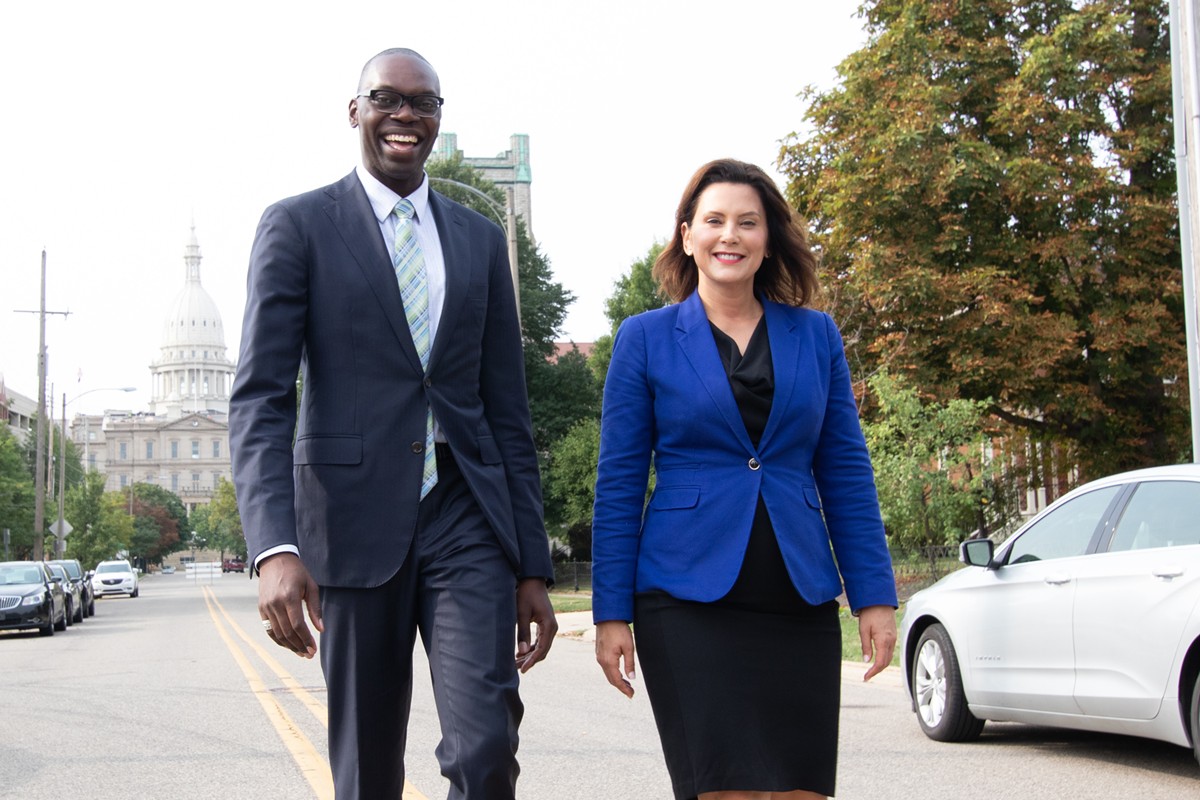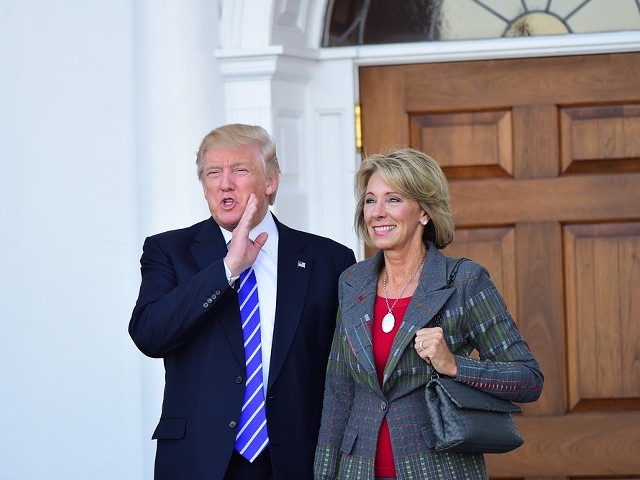Just months into her tenure, Michigan Gov. Gretchen Whitmer hit the African American-majority Benton Harbor School District with what many viewed as a harsh choice: Close its financially and academically struggling high school, or dissolve the entire district.
The proposal sparked fury in Benton Harbor. To many, the brutish move seemed straight out of former Republican Gov. Rick Snyder's playbook — during his tenure, his largely white administration regularly took over urban, Black-led cities and school districts so it could enact unpopular reforms.
Thus it came as a bit of a shock to find Whitmer, a Democrat, so quickly picking up one of Snyder's favorite weapons and wielding it against an African-American community, says Rev. Charles E. Williams II, pastor of Historic King Solomon Church and president of the National Action Network's Detroit chapter.
"This is the same tactic — the very same tactic — that Governor Snyder used to get people to sign consent decrees," he says. "'Either you're going to do this, or I'm going to take over.'"
The proposal led to charges of racism, attracted the attention of The New York Times, and has generally been a PR nightmare for the Whitmer administration. But while the Benton Harbor controversy remains the most glaring issue, African-American leaders who spoke with Metro Times offered a litany of concerns with the governor's urban policy — or lack thereof — and say she's failing Michigan's large cities.
"I'm sensing a whole lot of frustration," Williams adds.
Among other policies and positions, some questioned the governor's willingness to sign an auto insurance industry-friendly reform plan that was largely written by the GOP and likely won't provide much rate relief in urban areas. Her other major plan — a regressive 45-cent gas tax to raise money to fix the roads — would hit the state's poorest residents the hardest.
Months into her administration, Whitmer backed away from the fight for a constitutional guarantee for literacy that rose out of Detroit public schools. Meanwhile, the state continues siphoning tax dollars away from Detroit school kids so it can provide tax incentives for wealthy developers and corporations.
Whitmer's proposed budget calls for the elimination of Flip The Script, a mentorship and job-training program for those caught in the legal system, while she received criticism for how slowly the state is moving toward expunging marijuana convictions. The governor also hasn't followed through on her pledge to restore bottled water service to Flint.
Aside from disappointment over specific actions, Detroiters face a range of structural issues on which the administration has taken little or no action, says Donna Givens, CEO of the Eastside Community Network.
That includes a state tax structure that now favors the wealthy and corporations; tax revenue-starved urban cities; water shutoffs; the tax foreclosure crisis; charter schools that decimated inner-city public schools; and more.
The sum of the issues are leaving many urban voters "feeling ignored," Williams says, and that can have consequences.
"Democrats take Black voters for granted," he says. "We saw that with Hillary Clinton, so we should know they will say 'I'm out.' If Whitmer doesn't believe it, then she needs to look at [former Michigan] Gov. [Jim] Blanchard — he ignored Black people, then he didn't get re-elected."
‘If Black people feel nothing is going to change, then they’re more likely to stay home.’
tweet this
Indeed, voter turnout dropped sharply when Blanchard lost his second re-election campaign in 1990, while 90,000 fewer Detroit voters turned out for Hillary Clinton than Barack Obama after Clinton infamously ignored Detroit during the 2016 campaign.
"If Black people feel nothing is going to change, then they're more likely to stay home," says Chris White, director of the Detroit Coalition Against Police Brutality.
The questions come after Detroiters cast more votes for millionaire businessman Shri Thanedar than Whitmer in the 2018 Dem primary, and Williams says he and other leaders fear that her agenda is retribution for that.
Whitmer spokeswoman Tiffany Brown highlighted Whitmer's proposals and policies that she says benefits urban areas, and adds that Whitmer set out to "build an administration that's reflective of the diversity of the state."
"Governor Whitmer put forth a budget with real solutions — to fix the roads, clean up drinking water, and make sure every Michigander has a path to a high-wage career — to solve real problems that will make a difference in people's lives right now," Brown says.
But some of the accomplishments she notes are those that are controversial, like the auto insurance law.
Regardless, Whitmer faces an opposition party in control of the Legislature that's entirely uninterested in solving urban problems, and some of the issues for which she's receiving criticism are more nuanced than they appear on their face. But Detroit political activist Robert David says many African-American voters perceive a lack of fight on urban issues.
"Urban voters were expecting her to be more vocal and vigilant in terms of being on the front lines of issues that impact them," he says. "My fear is that she's going to find herself losing allies, which is not a good thing."
Questionable policies
In May, Whitmer signed an auto insurance reform bill at the Mackinac Policy Conference on Mackinac Island, a three-day event attended by politicians, lobbyists, corporate executives, and friendly media.
The bill doesn't actually end redlining, nor are there any guaranteed savings, as Whitmer and Republicans claimed. Instead, the new law is full of loopholes that will ultimately allow the auto insurance industry to save money while effectively eliminating the safety net for those who need long-term care after an accident.
White says there's a reason Whitmer chose to sign the bill on Mackinac Island instead of in Detroit among those who she claimed would benefit from the bill.
"The fact that she signed it at Mackinac lets you know whose interest it serves," White says. "She didn't sign it in any of the neighborhoods — she signed it with the corporate community that benefits from it. That lets you know where her heart was at."
No Republicans and only a handful of Democrats opposed the measure, including Detroit Rep. Sherry Gay-Danogo, who told The Detroit News there "wasn't enough lipstick on the pig."
‘The fact that she signed it at Mackinac lets you know whose interest it serves.’
tweet this
Meanwhile, Whitmer's proposed 45-cent gas tax would cost about $30 per month for a motorist who drives a compact car and uses one tank per week. The regressive tax requires someone living paycheck to paycheck to pay the same as a millionaire.
"Gas prices and insurance are already too high, and people are on the brink of not being able to afford vehicles," David says. "People barely can afford day-to-day living expenses. If you're going to add another expense to the daily budget — that would be a death sentence."
Whitmer is proposing offsetting that cost with a tax credit, but it's a credit for the working poor, which leaves out those who are between jobs or working under the table, and it forces people in tight financial positions to pay up front.
Notably, some Dems have better ideas. In April, progressive reps led by Robert Wittenberg proposed an alternative option that's much more friendly to residents in urban centers: Increase taxes on the state's richest residents while giving a tax cut to lowest earners. The proposal would raise $2.5 billion to fix the roads.
In Benton Harbor, the community pushed back hard against the governor's proposal, and though Whitmer softened her position slightly after the unexpected blowback, her latest offers for the district are also unpopular. Instead of examining the root causes of the district's crisis, which are entwined in structural issues around race, funding, and poverty, she continues threatening a takeover.
Democratic Attorney General Dana Nessel recently opined that Whitmer has no legal authority to close Benton Harbor's high school. She could, however, send a financial review team that could deploy an emergency manager.
White calls the situation revealing.
"Whitmer's view of Blacks being able to govern is not different from her predecessor," he says.
Others also voiced concern about the advisers and cabinet members around Whitmer. Black Detroit News columnist Bankole Thompson noted that Whitmer pledged to appoint a cabinet-level poverty secretary, but reneged on that. Meanwhile, White says there's frustration that Whitmer didn't appoint a Black commander of the Michigan State Police after recent high-profile cases involving race.
Though Whitmer picked Garland Gilchrist, a Black man, for lieutenant governor, and tapped two other Black men for her cabinet, White says the picks are "wonk" types who aren't viewed as connected to most urban communities. Similarly, Williams says he fears Gilchrist is being used for photo ops and should be given responsibility of meaningful issues that impact people in places like Benton Harbor, Flint, and Detroit.
"She's got Garlin Gilchrist, and if she uses him for more than window dressing, then I think she'll find that people have a lot more respect for her," Williams says.
'Politicians respond to people who bring money'
Eastside Community Network's Givens acknowledges that there are issues with the Whitmer administration's policies, but she also says urban residents need to do more to organize in a way that gives them a spot at the table from which demands can be made.
She points to the Coleman Young administration and the Shrine of the Black Madonna Church's success as an example of a political force that can help leverage cities' voting blocs in a way that gives urban areas more power.
A similar organizing apparatus no longer exists, Givens says, and there isn't a formidable group that's putting serious money into campaigns. And regardless of who is governor or president, the political process "privileges people with money and organizes around their agenda," she adds.
"I think what you don't have is an organized effort to demand things from politicians who represent us," Givens says. "The people who tend to get elected are running on a political agenda, and that political agenda is going to respond to moneyed interests. Politicians respond to people who bring money ... and we're not bringing anything."
She adds, "I would challenge people working in the community — let's sit down and come up with a plan."
White says Whitmer should seek more advice from Black leaders, and consider adding "a senior urban adviser who understands and cares about issues that impact African-Americans."
"We've moved past the stage of rhetoric and we need action, simply because we pay our tax dollars," he adds.
The governor could also do more to build a coalition with those leaders who supported her in the general election, even if they didn't in the primary, Williams says. He added that he recently received a call from a faith adviser in the administration, and he's encouraged by that.
Davis says he's confident in Whitmer and called her a "talented" former legislator who knows how to get things done. But he says she "needs to stand tall when it comes to certain issues, in particular issues that affect those who pushed her over the top to become governor."
"The administration needs to be thinking outside of the box and not putting a burden on those who can afford it the least," Davis says.
Stay on top of Detroit news and views. Sign up for our weekly issue newsletter delivered each Wednesday.







